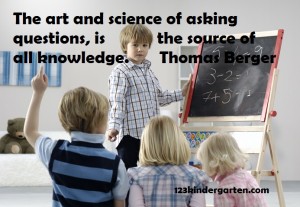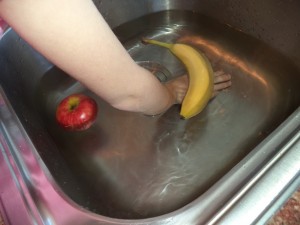Children ask dozens and dozens of questions a day–some estimates are as high as 300 in a single day, but curiosity gives a learning advantage. As parents, teachers, and caregivers we need to encourage it. In the words of Thomas Berger, “The art and science of asking questions is the source of all knowledge.” It would be impossible to answer all children’s questions. Some of them ask the same question over and over in the hope of getting a different answer, but we can answer a few of them. When we take the time to give kids some information, even if they don’t understand it all, they feel acknowledged. Their question hasn’t been ignored because it’s unimportant or silly and neither are they. Besides our answer, we give kids the message not only that it is okay to ask, but it is also okay to wonder.
It would be impossible to answer all children’s questions. Some of them ask the same question over and over in the hope of getting a different answer, but we can answer a few of them. When we take the time to give kids some information, even if they don’t understand it all, they feel acknowledged. Their question hasn’t been ignored because it’s unimportant or silly and neither are they. Besides our answer, we give kids the message not only that it is okay to ask, but it is also okay to wonder.
We can also provide kids with an example when we are curious and want to find out. Instead of just washing some an apple before cutting it for snack, you could wonder if the apple will float or sink. Ask your child what s/he thinks might happen and then run some water in the kitchen sink. Pop it in and check it out. Did it float or sink? You can suggest your child tries some other fruit and veggies, like strawberries, grapes, a banana, a carrot, orange, potato and whatever else you might have on hand. Encourage your child to make a guess each time before trying. This helps kids learn they don’t have to be ‘right’, it’s more important to find out.
 Kids who are curious are eager to learn. They are not scared if they don’t know the answer to something. Being right or wrong isn’t their goal, finding out is. The old saying, to “steal a march on someone,” means having an advantage or an edge. Can you see how the attitude of curiosity gives a learning advantage? Child’s play is based on wondering and trying. Will your child’s day support being curious?
Kids who are curious are eager to learn. They are not scared if they don’t know the answer to something. Being right or wrong isn’t their goal, finding out is. The old saying, to “steal a march on someone,” means having an advantage or an edge. Can you see how the attitude of curiosity gives a learning advantage? Child’s play is based on wondering and trying. Will your child’s day support being curious?
